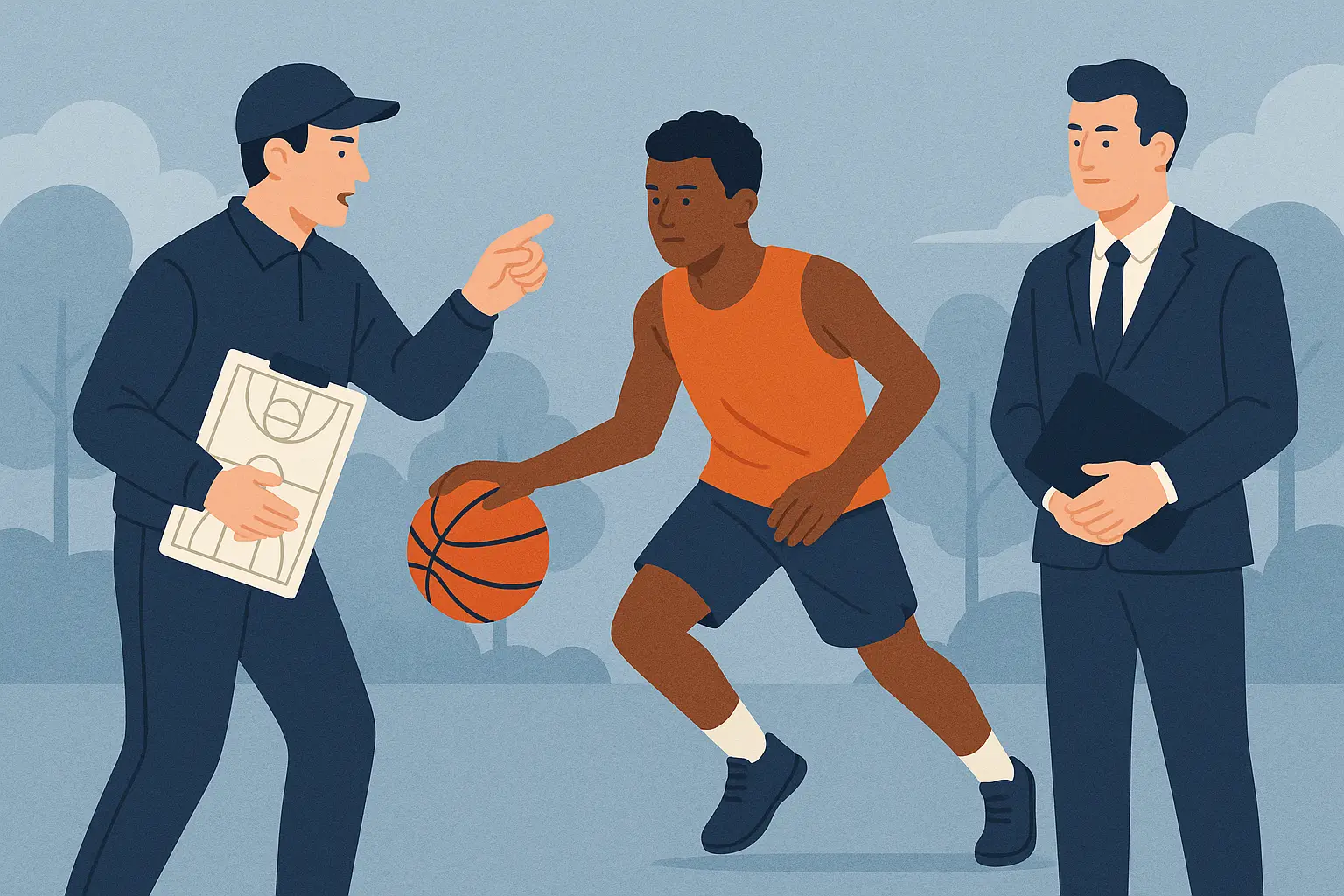Recruiters don’t just look for talent — they look for proof of performance. In sports and in the workplace alike, success is measurable. Whether you’re a football player, a volleyball coach, or a sports analyst, your athletic achievements can reveal powerful qualities such as discipline, leadership, and resilience — the very traits hiring managers value most.
Yet, most resumes treat achievements as an afterthought. A strong sports resume turns your matches, medals, and milestones into persuasive, job-relevant proof. In this guide, you’ll learn how to showcase your sports achievements effectively — with real examples, writing tips, and layout ideas that catch attention on both human and AI-powered platforms.
If you’re already building a profile for athletic or coaching roles, you may also explore:
- Sports Resume Guide — for complete formatting and structure
- Soccer Player Resume and Football Player Resume — for achievement phrasing ideas
Takeaway: Every stat, medal, or record you hold is a story of commitment. The right presentation can turn those stories into opportunities.
Why Sports Achievements Matter on a Resume
Recruiters pay attention to proof — and your sports achievements provide exactly that.
When you list athletic milestones, you’re not bragging about hobbies; you’re demonstrating habits that predict success in any field. Consistent training shows discipline. Competing under pressure shows mental resilience. Leading a team shows communication and decision-making. These are the same soft skills hiring managers seek when filling both corporate and athletic roles.
Sports also give your resume credibility. Numbers like “captained a university cricket team to a national top-3 finish” or “increased team win rate by 20% as assistant coach” instantly communicate performance. Employers don’t have to guess your abilities — they see measurable evidence of commitment and teamwork.
Even if your next role isn’t in sports, these achievements speak the universal language of performance. They help students stand out in college admissions, professionals appear more rounded, and coaches showcase proven leadership.
If you’d like to see how professionals frame these results in real resumes, the sports resume guide breaks down examples by role and experience level.
Takeaway: Sports achievements matter because they prove your ability to deliver results — not just describe them. They turn your character into measurable credibility.
Where to Include Sports Achievements on Your Resume
The best place to include your sports achievements depends on what stage of your career you’re in — and how central athletics is to your story.
There’s no single right answer, but here’s where recruiters naturally look for those results and how you can write them effectively.
In the Resume Summary
Use your summary to showcase one achievement that defines your athletic credibility right away. It’s perfect for coaches, fitness trainers, or athletes in leadership roles.
Example:
“Former national-level sprinter turned performance coach with 7+ years of experience helping youth athletes improve their sprint timings by up to 18%.”
Or:
“University football captain recognized for leading a 25-member team to consecutive championship titles; now applying that same discipline to corporate team management.”
Under the Experience Section
If your achievements were part of an official role — captain, coach, or coordinator — highlight them as bullet points under Experience. Use measurable outcomes and strong action verbs.
Example:
• Coached under-18 basketball team to state championship victory; improved team’s win-loss ratio by 35%.
• Trained 20+ players in match strategy and stamina optimization using video analysis techniques.
• Organized annual inter-college tournament with 500+ participants and secured two new sponsorships.
You can see a similar style in professional coaching profiles like a soccer coach resume, where achievements read like performance reports, not descriptions.
Within the Education Section (for Students or Freshers)
For students, the Education section is a great place to show balance between academics and athletics.
Example:
B.A. in Physical Education, Delhi University (2024)
• Captain, University Volleyball Team – led team to inter-college finals.
• Awarded “Best Athlete of the Year” for excellence in track and field.
These entries work even if you have limited professional experience — they still signal leadership, commitment, and recognition.
In a Dedicated “Sports Achievements” Section
If athletics is central to your identity, dedicate a short section for it.
Use bullet points and quantify your results whenever possible.
Example:
Sports Achievements
• Won 3 gold medals at the National Swimming Championship (2023, 2024).
• Represented India in South Asian Games, Men’s 4x100m Relay.
• Completed 10 marathons across India with consistent top-10% finishes.
Takeaway: Recruiters love clarity. Use concise, metric-driven lines that show results, not responsibilities — and place them where they naturally add weight to your story.
How to Write Sports Achievements Effectively
Your achievements should read like results, not responsibilities.
A recruiter skimming your resume should instantly see what you did, how well you did it, and why it mattered. To make that happen, follow three rules: use action verbs, quantify outcomes, and connect to impact.
1. Lead with Strong Action Verbs
Start each bullet with a verb that shows initiative or leadership — words that sound like motion, not maintenance.
Examples:
• Led the under-19 football squad to a district championship after two losing seasons.
• Organized inter-college athletic meets attended by 600+ participants.
• Implemented video-analysis drills that improved player accuracy by 20%.
Avoid bland verbs like helped, worked, or assisted. They dilute impact and don’t show ownership.
2. Quantify Every Possible Result
Numbers anchor credibility. Mention medals, rankings, time reductions, team size, or measurable improvements.
Examples:
• Increased overall team fitness scores by 15% through tailored endurance programs.
• Achieved state-level gold in javelin throw out of 120 competitors.
• Reduced average sprint timing by 0.8 seconds for five athletes in one season.
If you can’t find a number, describe scale — “regional,” “national,” or “top 10 finish.”
3. Show Transferable Impact
Tie each result to a professional quality — leadership, discipline, communication, or resilience.
Examples:
• Mentored 12 junior players, building a training system later adopted by the entire academy.
• Balanced full-time academics with elite sports training, demonstrating time management and focus.
• Captained college cricket team through three tournaments while maintaining a 3.8 GPA.
These show that your achievements are not just athletic wins — they’re evidence of workplace-ready skills.
4. Use “Before vs After” Improvement Statements
Turn static facts into stories of progress. Recruiters love visible growth.
Before: “Played for university basketball team.”
After: “Represented university basketball team; promoted to captain in second year and led team to two consecutive league titles.”
That single change transforms participation into performance.
Takeaway: Think like a coach reviewing a match report — every line should show what you achieved, how you improved, and what quality it reveals about you.
Sports Achievement Examples for Resume
Understanding what to write is as important as knowing where to place it. Below are role-specific examples that show how to phrase your achievements so they sound professional, measurable, and impactful. Each example follows one rule: results first, details second.
Table of Examples:
| Role | Example Achievement | How to Phrase in Resume | Why It Works |
|---|---|---|---|
| Player | Scored 18 goals in state football league | “Ranked among top 5 scorers in state football league, 2023 season.” | Converts numbers into credibility |
| Coach | Trained 15 players for state trials | “Coached 15 athletes; 6 qualified for state-level tournaments.” | Highlights measurable success |
| Student Athlete | Won inter-college 400m gold medal | “Secured 1st place among 30+ colleges in 400m sprint.” | Demonstrates competition performance |
| Sports Manager | Coordinated national-level tournament | “Managed logistics for 3 national tournaments with 500+ participants.” | Reflects leadership and organization |
| Fitness Trainer | Improved client performance metrics | “Enhanced clients’ endurance by 25% through structured conditioning plans.” | Adds quantifiable improvement |
| Sports Analyst | Compiled data for match strategy | “Developed analytical reports that improved team accuracy by 12%.” | Links data analysis to results |
Examples by Role
For Players
- Led district-level cricket team to consecutive championships (2022–2024).
- Achieved a batting average of 58.4 across three seasons.
- Represented state football team at National Games, 2023.
For Coaches
- Designed tactical programs that increased team win ratio by 30%.
- Trained 25+ young athletes; 10 selected for regional leagues.
- Implemented mentorship model adopted by other academy branches.
For Students and Collegiate Athletes
- Captain, Delhi University Volleyball Team – reached All-India semifinals.
- Balanced full-time academics with national-level training schedule.
- Won gold medal in inter-college athletics meet (400m relay).
For Sports Managers and Organizers
- Managed sponsorship operations worth ₹10L+ for annual sports fest.
- Supervised event coordination team of 40 volunteers across 3 venues.
- Negotiated vendor contracts reducing costs by 15%.
For Sports Analysts and Coordinators
- Delivered match performance insights using motion-tracking software.
- Monitored player fatigue levels, contributing to 10% reduction in injuries.
- Collaborated with coaching staff to refine player selection metrics.
Resume Examples
Athlete Resume Example
Name: Jordan Miller
Title: Student Athlete – Track & Field
Location: Seattle, WA | jordan.miller@email.com | LinkedIn: linkedin.com/in/jordanmiller
Professional Summary
Dedicated student athlete with a proven record of excellence in track and field, combining academic achievement with competitive performance. Recognized for discipline, leadership, and focus under pressure. Seeking opportunities to contribute to collegiate or semi-professional athletic programs while pursuing higher education.
Key Achievements
- Captained University Track Team to victory in two regional 400m championships (2023–2024).
- Maintained a top-3 finish ranking in 200m sprint events across three consecutive seasons.
- Awarded “Athlete of the Year” for outstanding performance and mentorship.
- Balanced a 3.9 GPA with 25+ hours of weekly training and competition commitments.
- Organized annual intra-university meet attended by over 200 athletes.
Core Skills
- Sprinting & Endurance Training
- Team Leadership & Collaboration
- Performance Goal Setting
- Time Management & Academic Balance
- Sportsmanship & Mentoring
Education
Bachelor of Science in Kinesiology
University of Washington, Expected Graduation: 2026
Certifications
- First Aid & CPR Certified – American Red Cross
- NCAA Compliance & Eligibility Certified (2024)
Awards & Honors
- Dean’s List – 2023, 2024
- Regional Athletics Council Scholarship Recipient
Coach Resume Example
Name: Emily Carter
Title: Football Coach | Youth Development Specialist
Location: Austin, TX | emily.carter@email.com | LinkedIn: linkedin.com/in/emilycartercoach
Professional Summary
Certified football coach with 7+ years of experience developing high-performance teams across high school and collegiate levels. Skilled in game strategy, athlete development, and motivational leadership. Known for building positive team culture and achieving measurable success through data-driven training programs.
Key Achievements
- Led the Austin High Varsity Football Team to consecutive state championship titles (2022 & 2023).
- Increased team win ratio by 42% through customized strength and conditioning programs.
- Mentored 10+ players who advanced to NCAA Division I scholarships.
- Coordinated pre-season training camps with 100+ athletes and support staff.
- Introduced tactical video review sessions that improved play accuracy by 18%.
Core Skills
- Athlete Development & Mentorship
- Team Motivation & Communication
- Tactical Game Planning
- Performance Analysis & Improvement
- Strength & Conditioning Programs
- Leadership & Team Building
Certifications
- USSF D-License – U.S. Soccer Federation
- CPR & First Aid Certified – American Red Cross
- NCAA Coaching Ethics & Compliance (2023)
Education
Bachelor of Science in Sports Coaching and Performance
University of Florida, 2016
Professional Associations
- National Federation of State High School Associations (NFHS)
- American Football Coaches Association (AFCA)
Sports Manager Resume Example
Name: Daniel Reed
Title: Sports Manager | Event Operations & Sponsorship Specialist
Location: Toronto, ON | daniel.reed@email.com | LinkedIn: linkedin.com/in/danielreedmanager
Professional Summary
Experienced sports manager with 9+ years of success in athletic operations, sponsorship acquisition, and large-scale event coordination. Skilled in managing multi-team tournaments, vendor relations, and athlete logistics. Recognized for improving efficiency, cutting operational costs, and creating seamless event experiences for athletes and spectators alike.
Key Achievements
- Managed six national-level tournaments hosting over 700 athletes and 40 sponsors.
- Negotiated $300K+ in sponsorships, surpassing annual revenue goals by 20%.
- Led a cross-functional team of 35 staff and volunteers to deliver three-day intercollegiate sports festivals.
- Reduced vendor expenses by 18% through cost optimization and contract renegotiation.
- Implemented new digital registration workflow that cut check-in time by 40%.
Core Skills
- Event Planning & Operations Management
- Sponsorship Development & Brand Partnerships
- Budgeting & Financial Oversight
- Team Leadership & Communication
- Vendor & Stakeholder Relations
- Sports Marketing & Promotion
Education
Master of Science in Sports Management
University of Leeds, U.K., 2016
Bachelor of Business Administration
University of British Columbia, 2013
Certifications
- Event Management Professional Certificate – Event Academy, London
- CPR & Emergency First Aid – Canadian Red Cross
Professional Memberships
- North American Society for Sport Management (NASSM)
- Sport Management Association of Australia and New Zealand (SMAANZ)
Tips to Make Your Sports Achievements Stand Out
Adding achievements is only half the job — making them stand out is what gets you noticed. Here are proven ways to present your sports accomplishments so they look credible, professional, and result-driven.
1. Prioritize Achievements That Reflect Professional Skills
Choose sports results that connect naturally to the qualities employers value most — leadership, consistency, teamwork, and discipline.
For example, captaining a football team shows the same leadership and communication skills valued in management or project-based roles. Avoid listing every match or event; highlight only those moments that show measurable contribution or growth.
2. Quantify Results Whenever Possible
Numbers add trust. Instead of “played for a regional team,” write “played 24 official matches, maintaining a 90% success rate in defensive tackles.”
Quantification shows performance, accountability, and scale — and helps your resume appear in keyword searches for measurable results.
3. Place Achievements Where They’ll Be Seen First
If athletics define your career, mention one key achievement in your summary and others in your experience or a separate sports achievements section.
For candidates where sports are secondary, integrate them naturally into education or extracurriculars. Recruiters should notice them within 10 seconds of opening your resume.
4. Use Clear, Concise Formatting
Avoid dense paragraphs. List achievements in short bullet points using consistent tense and layout.
Keep the focus on results, not storytelling. Example:
Coached district volleyball team to championship win after two consecutive runner-up seasons.
That line says more than a three-sentence description ever could.
5. Keep It Updated and Relevant
If your last recorded match or award was years ago, balance it with recent certifications or involvement (such as mentoring, refereeing, or fitness training).
An up-to-date achievement section signals that you still practice discipline and remain engaged with the sport’s ecosystem.
6. Maintain Consistency Across Templates
Whether you use a player-centric design like the Football Player Resume or a leadership-focused format like the Sports Manager Resume, keep your achievement style consistent — same bullet format, verb tense, and quantification logic.
This improves readability and strengthens the visual impression of professionalism.
Takeaway: Your sports achievements shouldn’t read like a list of events; they should feel like evidence of capability. Write each line to answer one question: “What did I prove through this achievement?” That single focus separates a strong resume from a forgettable one.
Common Mistakes to Avoid When Listing Sports Achievements
Even strong athletes and coaches lose impact on their resumes because of avoidable presentation errors. Avoid these pitfalls to keep your achievements sharp, credible, and professional.
1. Listing Every Match or Tournament
Including every game you’ve played or coached dilutes your key highlights. Focus on your top three to five accomplishments — the ones that show measurable progress or leadership. Quality always outweighs quantity.
2. Using Vague or Generic Phrases
Statements like “excellent player,” “good leader,” or “hard worker” don’t mean much without proof. Replace them with action-based results:
“Captained university basketball team to inter-college championship in 2024.”
This tells the reader what you did, when, and how successfully.
3. Forgetting to Quantify
Numbers make achievements real. If you skip them, even impressive experiences sound average. Always specify measurable impact: points scored, team size, ranking, medals, or percentage improvements.
4. Mixing Old and Irrelevant Achievements
Highlight achievements from the last five years, or those most relevant to your current goal. If you must mention older awards, keep them short and move them to a separate “Earlier Highlights” section.
5. Ignoring Relevance to the Job or Scholarship
Tailor your achievements to what the opportunity demands. A football player applying for a coaching position should emphasize mentorship and leadership outcomes, not just performance stats.
6. Poor Placement and Formatting
Don’t bury achievements in unrelated sections or long paragraphs. Use clear bullet points under “Experience” or a dedicated “Achievements” section. This improves both ATS scanning and human readability.
Takeaway: Your sports achievements should feel curated, not crowded. Think like a recruiter — if a detail doesn’t strengthen your professional story, it’s better left out.
Final Checklist Before Submitting Your Resume
Before you hit send, review your resume like a coach reviews a final game plan. A quick 2-minute check can make the difference between a shortlist and a rejection.
1. Check Quantification
Ensure at least half of your achievement bullets include numbers, ranks, or measurable outcomes.
Example: “Improved sprint timing by 0.8 seconds” reads far stronger than “Trained regularly for speed.”
2. Ensure Consistent Formatting
All bullets should follow the same structure — verb + result + impact. Maintain identical font, spacing, and alignment across sections.
3. Keep the Most Impressive Details at the Top
Your strongest results — national medals, major wins, or leadership roles — should appear within the top half of your first page. Recruiters spend less than 10 seconds on initial scans.
4. Verify Section Placement
Check that your achievements are placed logically:
- Summary – one headline achievement.
- Experience – detailed, quantified performance.
- Education or Achievements – additional highlights for balance.
5. Proofread for Clarity and Grammar
Avoid jargon or abbreviations unless common in your sport. Use clear, professional language that any recruiter can understand.
6. Optimize File Naming and Format
Save your document with a professional name such as Firstname-Lastname-Sports-Resume.pdf. Ensure it’s ATS-compatible — clean formatting, standard fonts, and no image-heavy layouts unless you’re linking to a design portfolio.
7. Update Before Every Application
Tailor a few lines each time you apply. Adjust examples to suit the role — a coaching application should emphasize mentorship; a management role should highlight coordination and leadership.
Takeaway: Your achievements can only shine if your resume presentation matches their impact. Treat this checklist as your final warm-up before stepping into the selection field.
Conclusion
Every match you’ve played, every medal you’ve earned, and every team you’ve led holds more than sentimental value — it’s evidence of discipline, growth, and accountability. When translated effectively, your sports achievements don’t just tell the story of what you did on the field — they show how you perform under pressure, adapt to challenges, and commit to excellence.
Whether you’re a student athlete, a professional player, or a coach guiding others toward success, the ability to document your wins with clarity and confidence transforms your resume from a simple document into a performance record. That’s what employers, scouts, and recruiters notice first.
If you’d like a deeper walkthrough of formatting, layout, and examples for different roles, explore our Sports Resume Guide. It breaks down how to align your athletic journey with professional goals — one achievement at a time.
Frequently Asked Questions
Yes. Sports achievements show transferable qualities like teamwork, time management, and leadership — traits valued in nearly every career. Even if your role isn’t sports-based, they give recruiters a sense of reliability and discipline.
Ideally, include achievements from the last five years. For older but significant wins (like national-level tournaments or major leadership roles), you can still include them briefly under an “Earlier Highlights” section.
Focus on measurable and recognized results — medals, awards, rankings, certifications, or leadership positions. For example, “Coached under-19 cricket team to district championship, 2023” is more effective than “Active cricket coach.”
Three to five impactful achievements are usually enough. Overloading your resume with every match or event can make key highlights harder to find.
Absolutely. Certifications like NFHS Coaching, CPR/First Aid, or Sports Nutrition add credibility and should be listed either under “Certifications” or within a dedicated “Achievements” section.
If your sports involvement was part of your college or school program, list it under Education. If it was external — like state-level championships or tournaments — you can create a separate Sports Achievements section for better visibility.
If quantification isn’t possible, describe the scope or recognition. For instance, “Represented state in inter-district badminton tournament” still adds value even without numeric metrics.
Yes. Platforms like LinkedIn allow sections for accomplishments or featured media. Upload images of certifications or event highlights (professionally presented) to strengthen your credibility beyond the resume.









